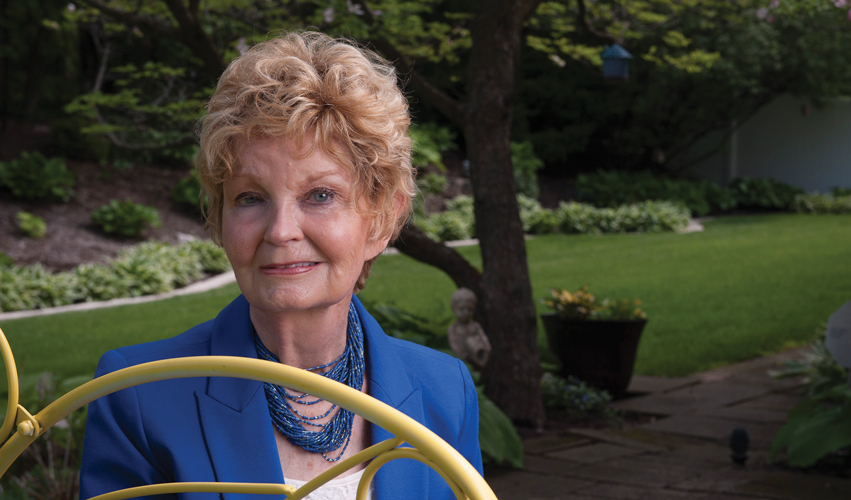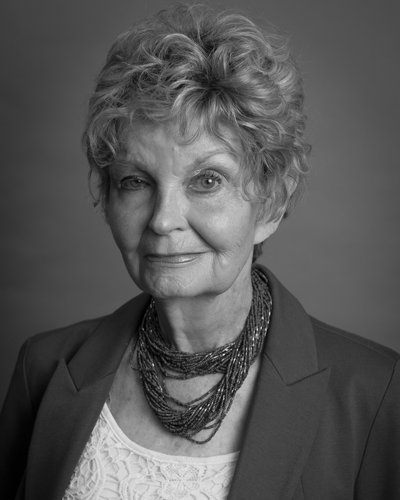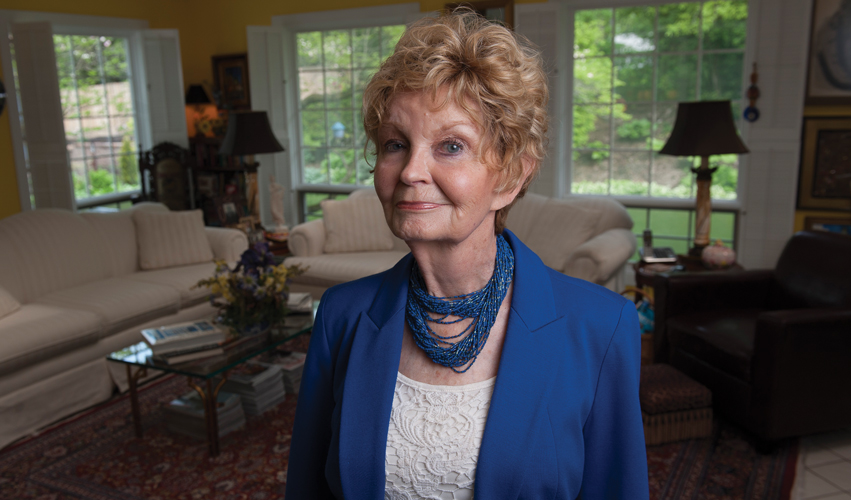
Photography by David Vernon
Genuine positivity has a way of shining through a person, its light filtering onto all those around them. When Anne Fox walks into a room, she radiates. Ask her about it, and she’ll graciously tell you how lucky a life she’s lived; ask about her perpetual smile, and she may even hand you a list of people to thank for it. But really, the outlook is all her own; and with it, she has lifted thousands of people in our community and beyond.
Born and raised in Peoria, Fox is a graduate of Peoria Public Schools and Bradley University. As CEO of the Central Illinois Chapter of the American Red Cross for more than three decades, she was responsible for coordinating disaster relief and emergency services, and organizing health and safety education. Under her leadership, the chapter’s youth education program became the largest in the country as she focused efforts on disaster prevention initiatives in babysitting, CPR, bicycle safety, safe driving and more.
Her volunteerism has spanned the community as well. She was the first woman to chair the Heart of Illinois United Way campaign, in addition to working with the United Way of Illinois and United Way of America. A strong supporter of Bradley University, she has served the College of Education and Health Sciences, Lewis J. Burger Center for Leadership and Service, and the Alumni Association. Her efforts have also touched the Children’s Home Association, Bleeding Disorders Clinic, Methodist College, University of Illinois College of Medicine Peoria, Peoria Symphony Orchestra, Peoria Area World Affairs Council, Peoria Public Library, Peoria Public Housing Authority, Forest Park Foundation, Eureka College and the Junior League of Peoria.
Her volunteer service and professional achievements have been recognized with a string of prestigious awards, including the Robert H. Michel Achievement Award, the Peoria Area Chamber of Commerce Athena Award and Tom Connor Award, Eureka College President’s Servant Leader Award, Junior League of Peoria Volunteer of the Year Award, the American National Red Cross Tiffany Award for Excellence, the YWCA/Community Foundation Legends Award, and many others.
Tell us about your roots and your connection to Peoria.
I still live in the same neighborhood where I was born… My grade school was small—we had three grades in one room and just 12 of us in my class when I graduated. Then I went to Peoria High School and Richwoods. I think with the small school your boundaries are less… because you’re doing things with students in the grades above and below… You could reach out and test your wings a bit. Peoria was a wonderful place to grow up—all the advantages of a small town, but because of Bradley University and Caterpillar, we have a lot of the sophistication, intellectual activities and culture of a much larger community. And I think our daughter had the same opportunities that I had.
Who helped to grow your heart? Did your family inspire your grand sense of public service?
My mother always volunteered. From the time I was a little girl, I remember my mother getting up and putting on her Red Cross uniform to volunteer on the Bloodmobile—faithfully, every Wednesday, no matter what. And she did all the things that mothers used to have more time to do at school. She was the room mother and helped with the school bazaar and the chili supper, and she volunteered at the hospital. It was just a way of life, and I think she and my father both found things for me to do as a child that were age appropriate—in high school I volunteered at the Red Cross. So I think it was just the way we lived.
Did you know at that young age that you wanted to continue with the Red Cross?
No, I didn’t (smiles). All I ever thought I’d do is grow up, go to college, get married, have a baby and be a mother. I never had any great visions to do any more than that—and that was a very fulfilling thing to do!
Is Bradley where you met your husband?
Yes. He was working there as the director of housing, and he chaperoned one of our sorority parties. My job at that point was to “entertain the chaperone.” So that’s what I’ve been doing for the rest of my life (laughing)—entertaining the chaperone!
Tell us about the years you spent raising your daughter, Amy. What were your goals as a mother? To raise a child that would have a happy, productive, growing life. I wanted her to enjoy all the things there were and never lose her curiosity, and to continue to learn and grow. I wanted her to feel responsible for her actions. I wanted her to have the skills to make her own decisions and the courage… to follow her dreams. We are very proud of our daughter.
 After your daughter left for college, why did you decide to go to work?
After your daughter left for college, why did you decide to go to work?
My husband was very encouraging to me when our daughter went to college. He said, “You know you’re going to be really bored, and there’s going to be a big void in your life.” So I was offered this opportunity at the Red Cross, and I thought, well, I’ll do it for a couple years until I get over her being gone. (laughs) It stretched on and on and on, and it was wonderful (smiles). I’m so lucky. I would’ve missed so much had I not had the opportunity.
I think the wonderful thing—and maybe it’s all nonprofits—is the people you meet—the volunteers who are there just because they want to help, and the board members who take time from their busy jobs and their work to come and help. I met so many great people. And I learned from all of them. That, I learned from my grandfather.
My grandfather was a big walker. Every night after dinner he would take me for a walk. He always told me, “No matter who you’re talking to, you learn something from them.” No matter who they are, they know something you don’t know, they’ve had an experience you haven’t had, and they can tell you about it and you can learn from it. It was wonderful advice! And it’s true.
Your position at the Red Cross required a balance of anticipating current needs while planning for future disasters. How did you predict disaster needs without ever knowing what was coming?
Well, you do know you’ll have them! You just don’t know what they’ll be, or when or where. We were fortunate because we had so many dedicated volunteers. They were our everyday operations. They took care of all of the fires in Peoria, the military families, youth education, first aid and CPR. Our job on the staff was to try to anticipate what was coming, and have the volunteers in place and trained. And we had a lot of disaster plans: what do we do if there’s an earthquake, a tornado or flood… Everybody knew their part.
Those big disaster plans were all coordinated with the other response agencies in Peoria—so we worked with the Police Department, Fire Department, AMT, the hospitals. We all knew if something happened who would do what, and we could just swing into action. That was a very big part of the professional responsibility—keeping those plans up to date—and then raising the money because Red Cross doesn’t charge for their disaster services or their services to military families… In one way, it seems that we spent a lot of time planning for disasters that never came, but I think all that planning helps. It keeps you on your toes. And all that training, even if it’s not needed for that specific disaster, is always worthwhile.
Our mission was to help people prevent, prepare for and cope with disasters, so everything we did fit into that mission... We were very proud here that we were the largest chapter in the country in terms of youth education. We taught kids—babysitting classes, bicycle safety, safe driving—all kinds of things to help prevent accidents to children. I suppose, in the strict definition those were not disasters, but the mission was broad enough that I think we were able to meet most community needs that were within that mission. We tried to never say no… but we were able to give them a referral to find someone who could provide what they needed.
How strong is that nonprofit referral safety net in our region?
It is very strong. I did a lot of work with other chapters around the country on national Red Cross committees, and I realized how lucky we were in Peoria because we do have a strong, cohesive network of social service agencies.
What was the culture like at Red Cross when you first started versus now?
You know, it’s funny. I don’t think the culture has changed, and I was there 30 years! I think the culture was one where if there’s a need, we’ll find a way to help, and that permeated through the staff, the board, the volunteers… Everyone had the same goal: to make a positive difference in other peoples’ lives. What has changed is the way we do it. Technology has made a huge difference in the way that we’re able to help people, and I think it will continue to in the future.
The other thing that never changed is the goodness of people. When horrible things would happen, people were streaming in the door to help. We always saw in the worst of times, the best side of people… I don’t think I ever saw a change in that. The first time I saw it, I was fairly new to the Red Cross. There was an earthquake in San Francisco. The next morning when I got to work, I couldn’t get in the parking lot! I didn’t know yet what had happened. It was people just coming to give money or to offer help. It was a wonderful experience for seeing a side of humanity that not everyone gets a chance to see.

How do you build that kind of culture?
Well, I think I was lucky. I think it was here when I came to Red Cross, and we just fostered it. We loved our volunteers. They were very much a part of all our planning. Between the day-to-day operations and planning for the future, we tried to have a lot of communication and input—because no one knows better what’s going on than the people in the field doing [the work], so you don’t want to plan in a vacuum… We just tried to make everyone feel that it was our mission. I think as long as we kept our focus and our eye on that mission, it kept the culture coherent.
It must have been difficult to hear all the stories of people who needed help. How did you deal with the stress of your position?
We had help for our Red Cross volunteers that were involved—mental health workers who were also volunteers. When people would come back from an assignment like Hurricane Katrina, where they had had a lot to deal with, they could work with the mental health workers. But even with the stories—and they are heartbreaking—we could help, and that makes a big difference. People were generous, and they donated money. And mainly in those kinds of disasters, what they need is money for food, clothing, shelter and medicine.
The other thing was, in a big disaster, the Red Cross didn’t just go in and meet with someone and help them. We stuck with them as long as they needed help. So the volunteers working with them could see the progress, [and] the people begin to heal and repair their lives. But it was very hard, especially where there were deaths or horrible injuries that were going to take years to recover from. But the volunteers never backed away—they were there to help.
Share some of your most rewarding memories at the Red Cross.
I have so many… When the planes hit the Twin Towers out in New York, about 45 minutes after the first plane hit, we got a call for nurses out there. Within a half hour, we had four of our volunteers at our office with their suitcases, getting in their car to drive to Chicago… They were going to be put on a military plane because they had shut down all commercial flights. At the time, it didn’t seem unusual to me at all that they would be willing to do that. But later, I thought how they didn’t know what they were getting into, they didn’t know if there was contamination in the air they were going to breathe, or if there was going to be another attack. And here they were: needed and ready to help.
After Hurricane Katrina, Amtrak provided free tickets out of New Orleans because people had nowhere to go, and they couldn’t take care of them there. So we got several hundred of them here in Peoria… Some of them had never been out of the inner city of New Orleans. This was the first time in their lives they had left Louisiana, and here they had gotten on this train and some of them still didn’t know where their families were, but their spirit—they were grateful to be alive, and they were grateful for the help Red Cross could give them. They were kind and just so resilient.
And then the memories in Washington, [Illinois] after the tornado. We had a center that we opened up, and the state was there to give them new driver’s licenses… and the Health Department was there with shots for tetanus—all the agencies were there to help. It was the same thing: the people were so resilient. Here they were, with their cuts and scrapes and just the clothes they had on. People had brought all these things to take—clothes and baby clothes and toys—but they were so cautious. They said, “Well, there might be someone who needs it more than I do.” When you talk about spirit—here they were looking out for people who might need it more… They didn’t want to take more than they needed—just the giving and the loving and the caring that I saw (smiles).
In your opinion, what is the future of the Red Cross?
Disasters are not going to go away, and the services we offer to military families are certainly very needed, and will continue to be. So I think there’s definitely always going to be a Red Cross. I think it will always be a volunteer organization, but I think the way service is provided is going to change a lot… As young people become our clients, they’re used to getting things from the internet. We’ve noticed the last few years with disasters here, the way we’ve often found out about a house being flooded and someone needing help was either through Facebook or Twitter. Rather than them calling us, they put it out online—“Hey, I’m stuck in my house! Can anyone come get me?” So we had volunteers that monitored all that so we could get to the people who needed help.
Do you have a mantra you worked by or live by?
You know, I wish I had a lot of wisdom to share with you (laughs), but I guess… I always tried to teach people, the volunteers and our staff [that] it really doesn’t hurt to make a mistake. It’s just a step in learning, in your progress. We had so many volunteers and such a wonderful staff, and because we were a not-for-profit, we had generally low salaries and lots of entry-level jobs. I hope I was able to give some people some wings and courage to try new things. I worked there long enough that I had people who came in straight from college and now they have kids in college. I think they have done things professionally that they never thought they would do because we were a small staff, always, and a little understaffed. People had to do more than they really meant to, and they were willing to do it. Every day was a stretch, and people rose to it, then they stretched again. It’s been very rewarding to see the growth—not just in the staff, but in the volunteers, and in myself because I did a lot of stretching, too.
I just feel like it’s a wonderful world we live in, and it’s full of wonderful people and it’s our choice how we’re going to live in it—if we’re going to reach out and take a bite of it and enjoy it, or if we’re going to just sit back and let it go on around us.
How do you want to be remembered?
I just hope people would remember me as someone they liked being with. I truly feel that I have been so lucky to have these opportunities. When you talk about the power of one or the power of many, I think I fit into the power of many. I enjoy working with people to accomplish a common goal, and I’ve always had the feeling that when you do that, then you have all these people who were all working together, and [the energy] spreads to their circles, and it has a ripple effect. And when you volunteer, you meet nice people because nice people are volunteers!
Well, you’ve touched a lot of lives through your work.
They’ve touched me. I’m just so blessed that all of this has come my way. iBi

